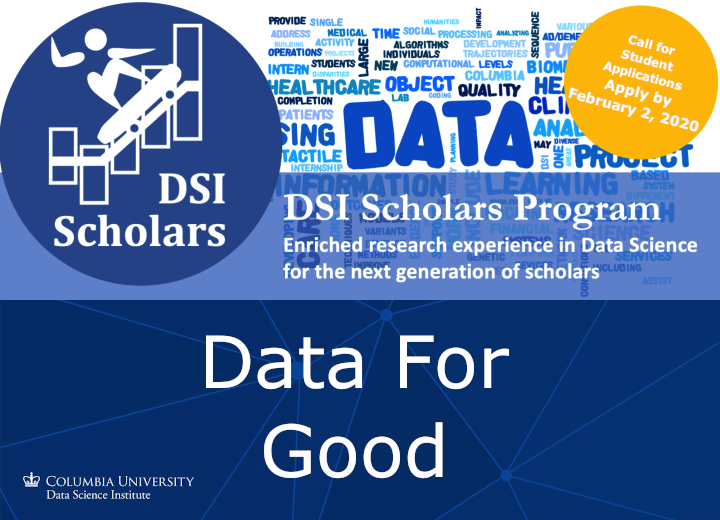Interested in a late-summer research project, or want to get a jump on the fall semester? We are restructing the application process for the Data Science Institute and Data for Good Scholars programs, but until that system is in place any projects we receive will be sent to this interim mailing list. Subscribe for notifications.

We have two additional projects (1,2) and are thus opening another round of applications. You can apply for these projects here. The deadline for this application is Friday, February 28th at 11:59pm.
If you applied previously, the original application form has been unlocked so that you can access your application materials. Do not use this form to resubmit - it will be ignored.
Many of the cryptocurrency transactions have involved fraudulent activities including ponzi schemes, ransomware as well money-laundering. The objective is to use Graph Machine Learning methods to identify the miscreants on Bitcoin and Etherium Networks. There are many challenges including the amount of data in 100s of Gigabytes, creation and scalability of algorithms.

Orienting to a novel event is a rapid shift in attention to a change in one’s surroundings that appears to be a fundamental biological mechanism for survival and essentially functions as a “what is it” detector. Orienting appears to play a central role in human learning and development, as it facilitates adaptation to an ever-changing environment. Thus, orienting can be viewed as an allocational mechanism in which attention sifts through the complex multi-sensory world and selects relevant stimuli for further processing. The selection of stimuli for further processing has implications for what will be encoded into memories and how strong those memory traces will be. The ability to differentiate between relevant and irrelevant input, to inhibit the processing of irrelevant stimuli, and to sustain attention requires control, and inhibitory processes that improve with age.


Columbia University Data Science Institute is pleased to announce that the Data Science Institute (DSI) and Data For Good Scholars programs for Spring-Summer 2020 are open for application.
The goal of the DSI Scholars Program is to engage Columbia University’s undergraduate and master’s students in data science research with Columbia faculty through a research internship. The program connects students with research projects across Columbia and provides student researchers with an additional learning experience and networking opportunities. Through unique enrichment activities, this program aims to foster a learning and collaborative community in data science at Columbia.
The Data For Good Scholars program connects student volunteers to organizations and individuals working for the social good whose projects have developed a need for data science expertise. As “real world” problems with real world data, these projects are excellent opportunities for students to learn how data science is practiced outside of the university setting and to learn how to work effectively with people for whom data science sits outside of their subject area.
Columbia’s Department of Statistics is running a summer research internship program for Columbia undergraduate students to work with its faculty on cutting-edge statistical research. This year, the internship will be during the first summer session (May 26, 2020 - July 2nd, 2020). Interns receive a stipend of $3,000 and are housed in undergraduate dormitories during the internship period.

This project builds on a novel cellular model of human aging (Sturm et al. Epigenomics 2019) where we can investigate trajectories of multiple molecular features of aging over long time periods. The underlying multi-omic dataset includes epigenomic (DNA methylation), proteomic (protein abundance), bioenergetics (mitochondrial respiration), telomere length, and various secreted factors. A major challenge for the DSI Fellow will be to integrate the multi-omic dataset to capture dynamic signatures of mitochondrial dysfunction and cellular aging, working collaboratively with other scientists. The existing project is expected to result in one or more publications. Possibility to continue work for pay over the summer.

